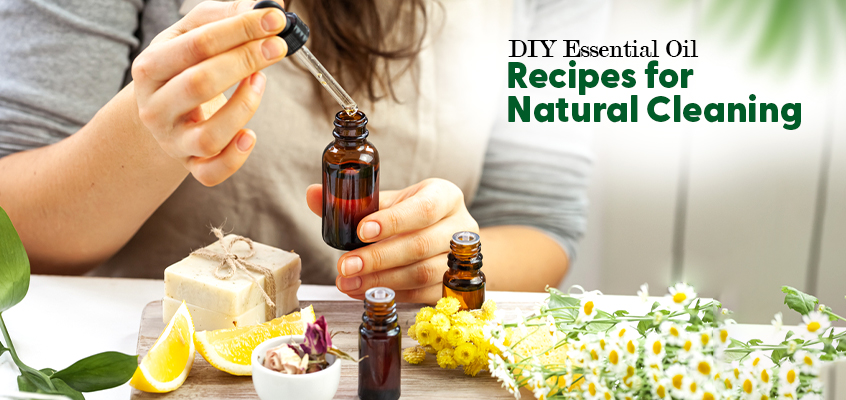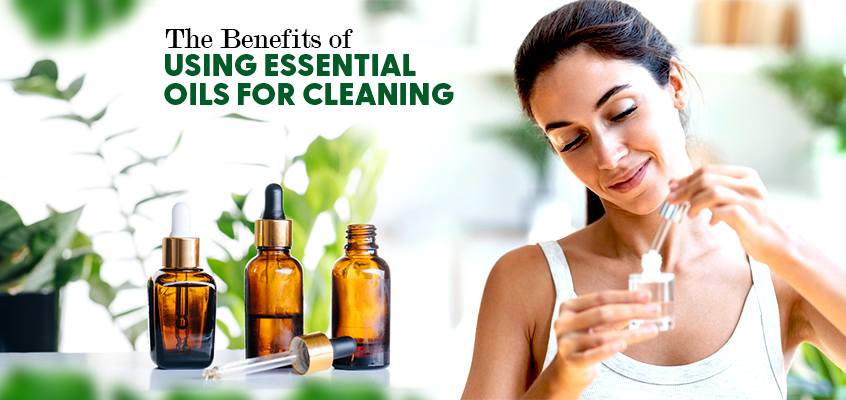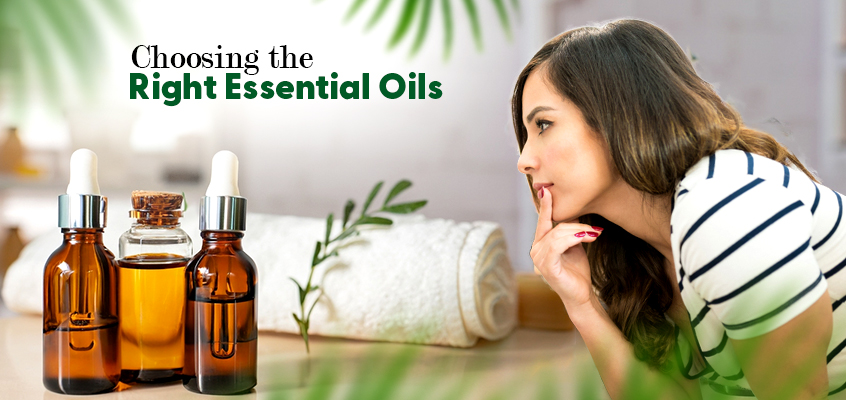The Guide to Custom Formulating Your Own Natural Cleaning Products with Essential Oils

Living a clean lifestyle is a decision, not a passing trend, especially if you have a new child at home. These days, more and more parents are choosing to use reliable, safe, and organic goods. You'll be pleased to hear that you may use essential oils to make your own natural cleaning products if you're one of them. You may create items that are specifically tailored to your requirements and tastes using bespoke formulation. For a thorough tutorial on creating your own natural cleaning solutions using essential oils, continue reading.
Essential Oils for Cleaning: Nature’s Best Secret
When it comes to natural cleaning alternatives, essential oils reign supreme. These aromatic liquids, derived from plants, have a reputation that spans centuries for their formidable antibacterial, antiviral, and antifungal properties. It's no wonder, then, that essential oils are an ingredient du jour for private labels, contract manufacturers, wholesale distributors, and third-party manufacturers specializing in green cleaning products.
Unlike synthetic fragrances, essential oils are pure and can leave your home smelling invigorating without any artificial undertones. Lemon essential oil, with its bright citrusy notes, can cut through grease and eliminate stubborn stains. Eucalyptus essential oil, on the other hand, with its bold, minty fragrance, can disinfect your surfaces while also invigorating your senses. Peppermint essential oil, with its sweet, cool aroma, is excellent for its antimicrobial properties, making it ideal for refreshing fabrics or carpets. And then there's tea tree essential oil, known for its potent antifungal and antibacterial properties, perfect for combating mold and mildew.
Harnessing the power of these essential oils, you can whip up your own cleaning products at home with ingredients you trust, safe in the knowledge that they're effective and free from harsh chemicals. Plus, you're contributing to a more sustainable future by reducing the number of plastic cleaning product containers you use and discard.
But, the best part is, that custom formulation allows you to tailor your products to your unique needs. Need a stronger disinfectant? Add more drops of tea tree oil. Prefer a milder, more soothing scent? Lavender essential oil might be your best friend. As you experiment with different oils and their combinations, you'll find that the possibilities are virtually endless.
The natural cleaning revolution is here, and essential oils are leading the charge. With just a few drops, you can transform your everyday cleaning routine into an aromatic experience that's as effective as it is enjoyable. So, why not give it a whirl? Your home and your senses will thank you.
DIY Essential Oil Recipes for Natural Cleaning
Unleashing the magic of essential oils in your home is just a few drops away. Here are some simple, tried-and-true recipes for homemade cleaners that you can easily concoct right in your kitchen.
Let's start with an all-purpose cleaner that will make your surfaces sparkle. Pour 1 cup of water and 1 cup of vinegar into a spray bottle. Add in 20 drops of the dynamic lemon essential oil for its renowned grease-cutting and stain-removing properties. You've got yourself a powerhouse of a cleaner that's ready to tackle any cleaning task with gusto.
Are you looking to refresh your carpet? This natural carpet deodorizer is a game-changer. Combine 1 cup of baking soda with 15 drops of soothing lavender essential oil in a jar. After letting it sit for a few hours to allow the ingredients to meld, sprinkle it generously on your carpet. As the fragrance of lavender fills your room, your carpet gets a refreshing lift and a clean, vibrant scent.
Streaky windows and mirrors will be a thing of the past with this homemade glass cleaner. In a spray bottle, mix together 1 cup of distilled water, 1/4 cup of white vinegar, and 10 drops of cool peppermint essential oil. This concoction will not only leave your glass surfaces spotless but also add a refreshing minty aroma to your space.
Remember, these recipes are just starting points in your natural cleaning journey. Feel free to customize them based on your preference. Want a more soothing scent? Substitute the lemon essential oil in your all-purpose cleaner with lavender or chamomile essential oil. Need to tackle stubborn mold? Add a few drops of tea tree oil to your concoctions. The beauty of DIY cleaning recipes is that they're easily adaptable. So, go ahead, channel your inner chemist, and explore the endless possibilities of cleaning with essential oils!
The Benefits of Using Essential Oils for Cleaning
Stepping into the world of essential oils for cleaning opens the door to a host of benefits. One of the most significant is the sheer power of these natural solutions. Essential oils pack a potent punch when it comes to tackling dirt, grime, and bacteria. The antiviral, antifungal, and antibacterial properties of essential oils are well-documented and have made them a popular choice for third-party manufacturers, wholesale suppliers, and private labels. By using these powerhouses in your cleaning routine, you’re effectively harnessing the might of nature to keep your home fresh and clean.
Essential oils also come with the unique advantage of being customizable. Contract manufacturing, white labeling, or even DIY-ing your cleaning products gives you the chance to tailor your products to your individual needs and preferences. This means you can experiment with different oil combinations until you find the perfect formula for your home. Need something to combat those stubborn kitchen stains? Try a mix of lemon and rosemary essential oils. Looking for a relaxing scent to infuse into your linens? A lavender and chamomile blend could be just the ticket. The choice is yours, and the options are nearly limitless.
Then there's the added bonus of essential oils being a healthier option for your family. Many conventional cleaning products are laden with harsh chemicals that can trigger allergies, exacerbate asthma, or even cause long-term health effects. By switching to essential oils, you're opting for a more natural, non-toxic alternative. This is particularly beneficial for homes with little ones or pets, as essential oils are gentler and safer.
Another hidden advantage of essential oils is their impact on the mood. Aromatherapy, anyone? Beyond just cleaning, the scents of essential oils can evoke different emotions and responses. Peppermint is known to invigorate and uplift, lavender can promote calmness and relaxation, while citrus scents like lemon and orange are renowned for their ability to energize and refresh. By cleaning with essential oils, you’re not only scrubbing away dirt and grime but also cultivating a home environment that's soothing and uplifting.
And last but certainly not least, using essential oils is an eco-friendly choice. Many essential oils are derived from renewable resources and are biodegradable, meaning they won't contribute to water or soil pollution. By crafting your own cleaners, you also reduce the use of plastic containers and packaging, supporting a more sustainable, green lifestyle.
In a nutshell, the benefits of using essential oils for cleaning go far beyond just a spotless home. They offer a customizable, safe, health-promoting, mood-boosting, and environmentally-friendly alternative to traditional cleaning products. It's clear to see why OEMs, ODMs, and even everyday homemakers are turning to essential oils for their cleaning needs.
Choosing the Right Essential Oils
With a wealth of essential oils on the market, the task of choosing the right ones for your homemade cleaning products can seem daunting. But worry not, this guide is here to help you navigate through the vibrant world of essential oils.
When selecting essential oils, consider two crucial factors: the oil's properties and your personal preference. The power of an essential oil lies in its unique properties. For example, tea tree oil, known for its potent antifungal and antibacterial traits, is perfect for combating mold and mildew. Lemon oil, with its grease-cutting ability, is excellent for all-purpose cleaners. On the other hand, the calming scent of lavender oil can create a relaxing atmosphere while also acting as a mild disinfectant. So, be sure to understand the cleaning properties of each essential oil to harness its full potential.
However, as you'll be the one using these products in your home, your preference plays an integral part in the decision-making process. If you're a fan of fresh, citrusy aromas, you might lean towards lemon or grapefruit oil. If you prefer something warmer and more comforting, cinnamon or clove oil could be your pick. The beauty of custom formulation is that it allows you to create a cleaning solution that's tailored to your scent preferences and cleaning needs.
Quality is another important consideration when choosing essential oils. Always opt for 100% pure essential oils. While these might be a little more expensive, they're free from fillers, additives, and synthetic fragrances, ensuring you're using only natural ingredients in your homemade cleaning products.
Additionally, the source of your essential oils matters. Seek out reputable wholesale distributors, private label companies, or contract manufacturers who are transparent about their sourcing and extraction methods. Some companies even offer third-party manufacturing, where you can specify the exact oils you want for your custom formulation. This is a fantastic option if you're particular about the origins of your essential oils or if you're looking to go down the wholesale supplier route.
Lastly, consider the sustainability aspect. Many essential oils are harvested from plants that grow abundantly in certain regions. However, some oils come from plants that are threatened or endangered due to over-harvesting. Sandalwood, Rosewood, and Frankincense are a few examples. Therefore, do some research or speak to your supplier to ensure your choice is environmentally sound.
By carefully considering your preferences, understanding the properties of each oil, focusing on quality, and paying attention to sustainability, you can choose the right essential oils for your homemade cleaning products. Remember, your custom formulation journey is about exploring and experimenting, so don't be afraid to try different oils and combinations to find your perfect match. The world of essential oils is vast and diverse, waiting for you to discover its wonders. Happy formulating!
Understanding Essential Oils and Their Cleaning Properties
Dive into the vibrant world of essential oils, and you'll quickly discover that each one is a star in its own right, each with its own unique cleaning superpowers. The key to mastering the art of custom formulation lies in understanding these cleaning properties, so let's take a closer look at some popular essential oils and what they bring to your natural cleaning arsenal.
Lemon oil, a staple in many DIY cleaners, boasts an exceptional ability to cut through grease and lift away stubborn stains, all while leaving behind a fresh, energizing scent. It's an ideal choice for kitchen cleaners or laundry stain removers.
Tea tree oil takes the spotlight when it comes to combating mold and mildew. Its potent antifungal and antibacterial properties make it a force to reckon with, turning your bathroom cleaner into a true mold-busting superhero.
If you're seeking an oil with potent antimicrobial abilities, look no further than peppermint oil. It's perfect for adding to carpet cleaners, fabric refreshers, or air purifiers, thanks to its refreshing, cool aroma and its effectiveness in keeping microbes at bay.
Eucalyptus oil, with its bold, invigorating fragrance, is a natural disinfectant. It's perfect for adding a refreshing, minty touch to surface cleaners or even toilet cleaners.
Lavender oil brings a soothing, relaxing quality to the mix. Its gentle disinfecting properties make it an excellent addition to linen sprays or room fresheners, helping to create a peaceful, calming environment in your home.
Clove oil is a powerhouse in the realm of mold and mildew elimination. It’s also known to repel pests, making it a great addition to homemade pest control solutions.
But wait, there's more! The beautiful thing about essential oils is their versatility. For instance, while lavender oil is known for its soothing properties, it also has antibacterial traits, making it an effective addition to hand soaps or dish soaps. Similarly, tea tree oil, besides its antifungal abilities, is also a natural deodorizer, perfect for freshening up your spaces or cleaning your trash cans.
Bear in mind, though, that essential oils are potent substances. When using them in your homemade cleaning products, always dilute them appropriately. A general rule of thumb is to add about 10-20 drops of essential oil to every cup of cleaner. Of course, this can vary based on the specific oil and your personal preferences, but it's a good starting point.
Also, remember that some oils are phototoxic, meaning they can cause skin reactions if exposed to sunlight. So if you're creating a product that you'll be using on your skin, such as a hand soap or lotion, be sure to research whether your chosen oil is safe for such use.
The fascinating world of essential oils is packed full of potential. By understanding their unique cleaning properties, you can create a collection of customized, all-natural cleaning products that not only do a fantastic job of keeping your home spotless but also bring joy, wellness, and harmony into your living spaces. Welcome to the wonderful world of essential oils - your natural cleaning journey starts here!
You May Also Like:



